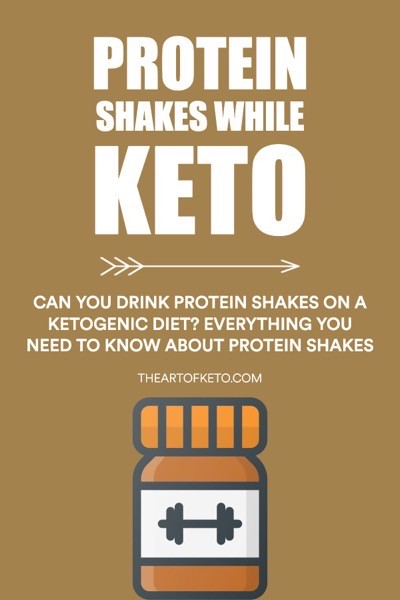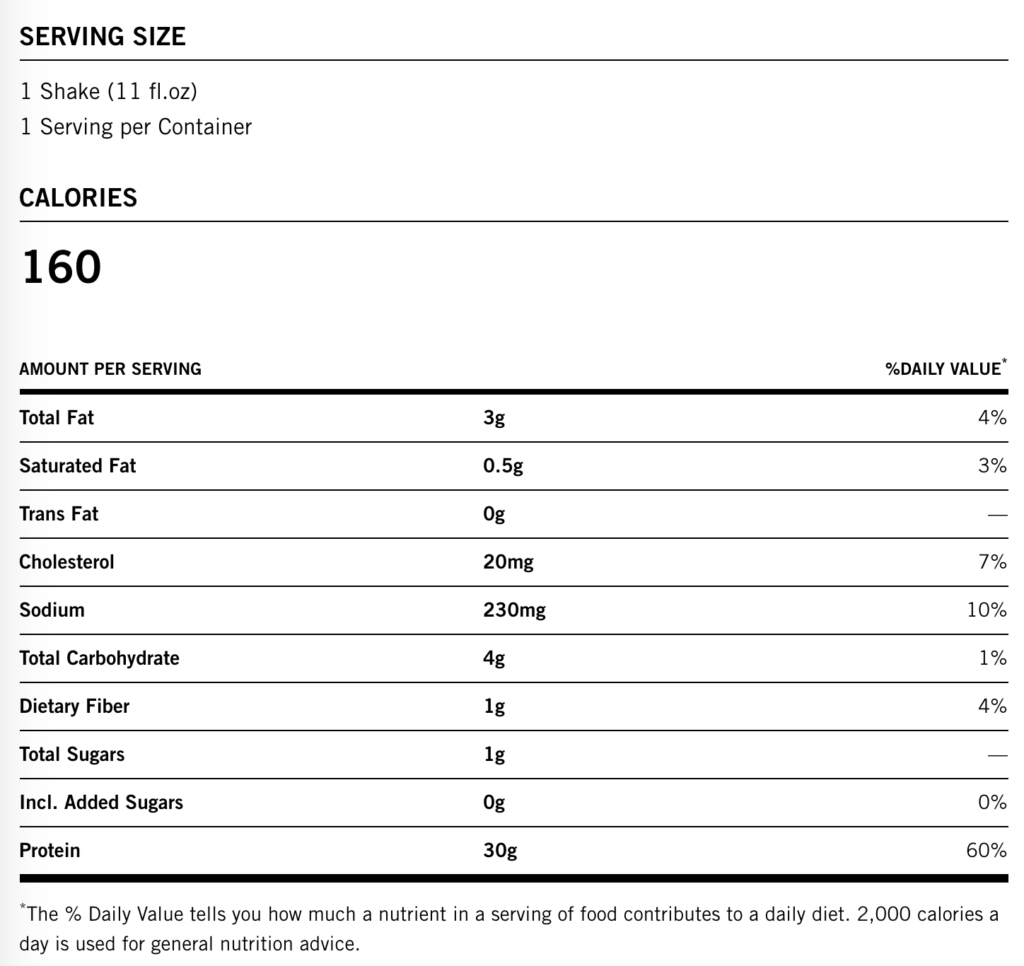Sometimes switching to a ketogenic diet can be a significant change for many individuals. Not only are you likely eating more fat (at least good fats) than you had in the past, but some may not be used to eating this much protein either. So many people are naturally asking the question of whether they can drink protein shakes on keto and if they’re keto-friendly.
Various protein shakes are allowed on a keto diet so long as they have no or very low amounts of carbohydrates. Recommended protein shakes with a minimal amount of carbohydrates are protein isolates and hydrolyzed proteins from various sources, including whey, pea, and brown rice.
In this article, I’ll go over whether whey protein is keto-friendly, which protein powders you should stick to, how much protein you should be eating, the popular question of whether too much protein will knock you out of ketosis, and much much more.

Table of Contents
Is Whey Protein Keto Friendly?
Since most people are familiar with whey protein, and it’s the type you most see on the shelves, people will wonder if whey protein is keto-friendly.
Is whey protein keto-friendly? 100% whey protein is keto-friendly.
Make sure to take notice of the 100%, that’s because some whey protein powders can come in the form of meal replacement shakes, like Soylent, or filled with added sugars.
When choosing a whey protein powder, you must look at the nutrition label and make sure you’re purchasing a whey protein that is strictly whey protein, which includes:
- Whey protein concentrate
- Whey protein isolate
- Whey protein hydrolysate
Here are few of my favorite whey-based protein shakes based on price, flavor, and 3rd party lab tested for quality:
Why Whey Isolate Protein Powder?
Whey isolate is processed differently than whey concentrate, which results in the isolate containing more protein and less other stuff (carbs, fats, lactose) per serving.
If you’re trying to minimize any discomfort from lactose and spare every carbohydrate possible, stick to a whey isolate powder.
Whey isolate may be a little more expensive, but with as many different choices there are today, prices have come down quite a bit.
Whey is used more than any other protein powder due to the rich amino acid profile, especially leucine, which is important for stimulating muscle protein synthesis. 1 2
Here are two of my favorite whey isolates:
When NOT To Use Whey Protein
Whey protein is popular due to:
- Amino acid profile
- Relatively cheap
- Fast digesting
Whey protein is a fast-digesting protein; for some, this may not be the most ideal, especially if you’re also practicing intermittent fasting (time-restricted eating).
While it’s not too big of a deal if you are also consuming other protein sources, in some instances, it may be more beneficial to consume a much slower-digesting protein, such as before bed.By consuming a slower digesting protein, you will have a steady stream of amino acids being absorbed during the times you’re going without food.

Another option is to consume fiber with your whey protein to slow-down the absorption, such as psyllium husk or Metamucil.
In this case, if you’re still choosing a protein shake, a milk protein isolate or a casein protein may be ideal due to its slow release relative to whey protein.
- Optimum Nutrition 100% Casein
- PEScience Select Protein (Whey/Milk blend)
Which Protein Powder Is Best For A Keto Diet?
A lot of people wonder which protein powder they should use on a ketogenic diet, and my best answer is there is no best protein powder for a ketogenic diet, and here’s why.
All protein powders and shakes are is liquid food.
There is virtually no difference between eating 20 grams of protein vs. drinking 20 grams of protein from a shake.However, sometimes you may not have the appetite to eat additional protein or may find a protein shake a more convenient option when out or on the go.
In this case, a protein shake is a perfect alternative to get in the additional protein you need to hit your goal.
When it comes to choosing a protein powder, it’s best to find one you can afford, enjoy the taste of, can tolerate well (no digestion issues), and is of good quality.
If drinking whey protein causes you gas and stomach upset due to lactose intolerance, you should stick to a whey protein isolate, which contains less than 1 percent of lactose. Another option if you’re lactose intolerant is using a vegan-based protein powder.
Here are my go-to’s for whey protein isolate and vegan protein
Can Too Much Protein Knock You Out Of Ketosis
I know what many of you are thinking…
Can too much protein knock you out of ketosis? No, too much protein will not knock you out of ketosis.

Most people following a ketogenic diet fall into the trap of eating too little protein. They inevitably run into problems by eating too little protein on a ketogenic diet, such as:
- Hair falling out
- Feeling weak and tired
- Brittle nails
- Peeling skin
- Always hungry or sometimes not hungry at all
- Sick more often
- Losing muscle mass
As you may see, there’s a problem with eating too little protein. When it comes to protein, too much is better than too little.
The body does convert some protein into glucose (sugar), via what is called gluconeogenesis, but that is a demand-driven process.
Meaning, the body only does so when it is necessary.
It doesn’t matter if you eat 50 grams of protein or 500 grams of protein; the body will only convert what it needs.
For those of you who test ketones, via something like a blood meter, you will notice that your ketones may not get as high, but consuming “a lot” of protein will not kick you out of ketosis.
For more information about other popular questions people have about being kicked out of ketosis, check the article below to learn what exactly will kick you out of ketosis.
How Much Protein On Keto
How much protein on keto is often debated amongst the keto-community, but as I stated earlier, too much is better than too little.
Protein is the most important macronutrient when it comes to:
- Satiety
- Bone health
- Enzymes, hormones, and other bodily functions
- Maintaining muscle (losing muscle slows your metabolism)
Based on how much work you want to put in to figure it out, I’ll present you with two methods:
- Lean body mass (most accurate)
- Desired body weight (most simple)
Lean body mass method
When it comes to protein, you shouldn’t be basing how much you eat on a random percentage you found on the internet. Instead, you should be eating protein based upon how much lean body mass (LBM) you carry.
To calculate lean body mass:
- LBM = Total Body Weight – Fat Weight
- As an example, if Suzy was 175 lbs and 30% body fat:
- 30% of 175 is 52.5, so Suzy has 52.5 lbs of fat weight
- 175 – 52.5 = 122.5 lbs = Suzy’s lean body mass
Suzy would then eat somewhere between 0.8 grams to 1.2 grams per pound of lean body mass. In this case, Suzy would consume between 98 and 147 grams of protein per day MINIMUM.
Desired bodyweight method
Another more simple way to calculate protein for those that don’t know their body fat or want an easy way to figure it is to eat 1 gram of protein per pound of desired body weight.
What does that mean?
If you weigh 150 lbs currently, but your goal weight is 120 lbs, then you would eat 120 grams of protein per day.
You can also use the keto macro calculator to give you a good starting point.
Honestly, If you read a website that tells you too much protein will kick you out of ketosis due to “gluconeogenesis” and whatever else, I suggest you exit and stop reading.
The truth is, they either don’t know what they’re talking about, or they hired some writer who simply copied another website, which reverts to…
They don’t know what they’re talking about.

Are Protein Shakes Bad For You
Within the context of a ketogenic diet, you shouldn’t worry about drinking protein shakes, kicking you out of ketosis, or “spiking your insulin.”
Also, a year-long study in which participants consumed nearly >3g/kg/day showed no harmful effects on any measure of health. 3
Without any pre-existing medical condition, such as impaired liver or kidney function, relatively high protein intake show no harmful effects. You’ll also likely not be eating close to the 3kg/day that the participants were consuming.
As I’ve stated earlier, you just want to be cautious that you don’t accidentally purchase a meal replacement shake, which has added sugars.
Although there are individual companies that do make keto-friendly meal replacement shakes.
Unless you have an allergy to lactose, in which you should opt for a whey protein isolate or vegan-based protein powder, there is no need to shy away from drinking protein shakes.
Why Drink Protein Shakes
A protein shake may be a more convenient option for you to hit your daily protein intake, and that’s perfectly ok.
Protein shakes make a convenient source for many individuals to hit their daily goals.
Aside from convenience, the most crucial factor is your overall protein intake.
If you don’t want to drink protein shakes and rather eat your protein, there is no need to consume them.Are Protein Shakes Good For Weight Loss?
Protein shakes do not offer any inherent benefit for weight loss UNLESS you are not getting in enough protein.
However, the protein itself (whether from food or shakes) may reduce hunger and also boost metabolism through the thermic effect of food (TEF). 4 5
The thermic effect of food (TEF) is the amount of energy (calories) your body requires to digest, absorb, and metabolize a meal.
The following is the TEF for the different macronutrients:
- Protein (20-30%)
- Carbohydrates (5-10%)
- Fat (0-3%)
Consuming a higher percentage of protein in the diet will lead to more energy expended through digestion than fats or carbohydrates.
Basically, you’ll burn more calories without having to do anything except eat a more substantial proportion of your calories from protein versus the other two macronutrients.
Are Premier Protein Shakes Keto Friendly?
One of the protein shakes I get asked a lot about is the premier protein shakes, and that’s because they are conveniently already pre-mixed and ready to drink.
Many people also find these protein shakes at their local Costco, Sam’s Club, and other warehouse clubs.
Even my mom buys these shakes and drinks them, and after trying them… they are quite tasty.
Are premier protein shakes keto friendly? Premier protein ready to drink protein shakes is keto friendly with 4 grams of total carbohydrates, 1 gram of dietary fiber, leaving only 3 grams of net carbs per shake.

Interested in other ready to drink (RTD) protein shakes?
Look no further than one of the original (and might I add tasty) RTD protein shakes, muscle milk, which is also keto-friendly. Find out exactly which ones are the most keto-friendly in the article.
What’s A Good Vegan Keto Protein Powder?
Whether you are lactose intolerant or prefer a non-dairy based protein powder source, vegan protein powders can be another convenient solution.
Fortunately, in recent years, many companies have improved their high-quality vegan protein powders with a full spectrum of all the essential amino acids.
In terms of a good vegan keto protein powder, my recommendation would be to use a rice and pea protein blend. A rice and protein blend has a comparable amino acid profile to whey protein, thus why they call it the “vegan whey.”My choice for a good vegan keto friendly protein powder:
Best Tasting Low Carb Protein Powder?
Taste is subjective.
Meaning, I may think something tastes excellent, and you may think it tastes (as my girlfriend puts it) like butt.
Therefore, take these recommendations with a grain of salt. However, I’ve tried almost every protein powder under the sun, and these are my favorites. These also get a stamp of approval from the significant other who isn’t a fan of protein powders to begin with.
- Musclefeast Grass-fed Whey (chocolate)
- Dymatize ISO 100 Hydrolyzed (cookies and cream)
- PEScience Select Protein (chocolate peanut butter)
Another option is to use a company such as True Nutrition, which I’ve used over a decade. With True Nutrition, you can customize your protein powder from a variety of sources, choose to add other things like electrolytes, and even select your flavor and flavor strength.
The Takeaway
Protein shakes are perfectly acceptable on a ketogenic diet as long as they are not filled with added sugars, such as those found in meal replacement shakes.
There is also no need to worry about too much protein kicking you out of ketosis or protein powders spiking your insulin; it’s merely untrue as I’ve gone over above.
If you’re lactose intolerant, you may want to consider sticking to a whey protein isolate or try vegan-based protein powder.
A rice and pea protein blend have a comparable amino acid profile to whey protein, which makes it a great alternative to whey protein.
